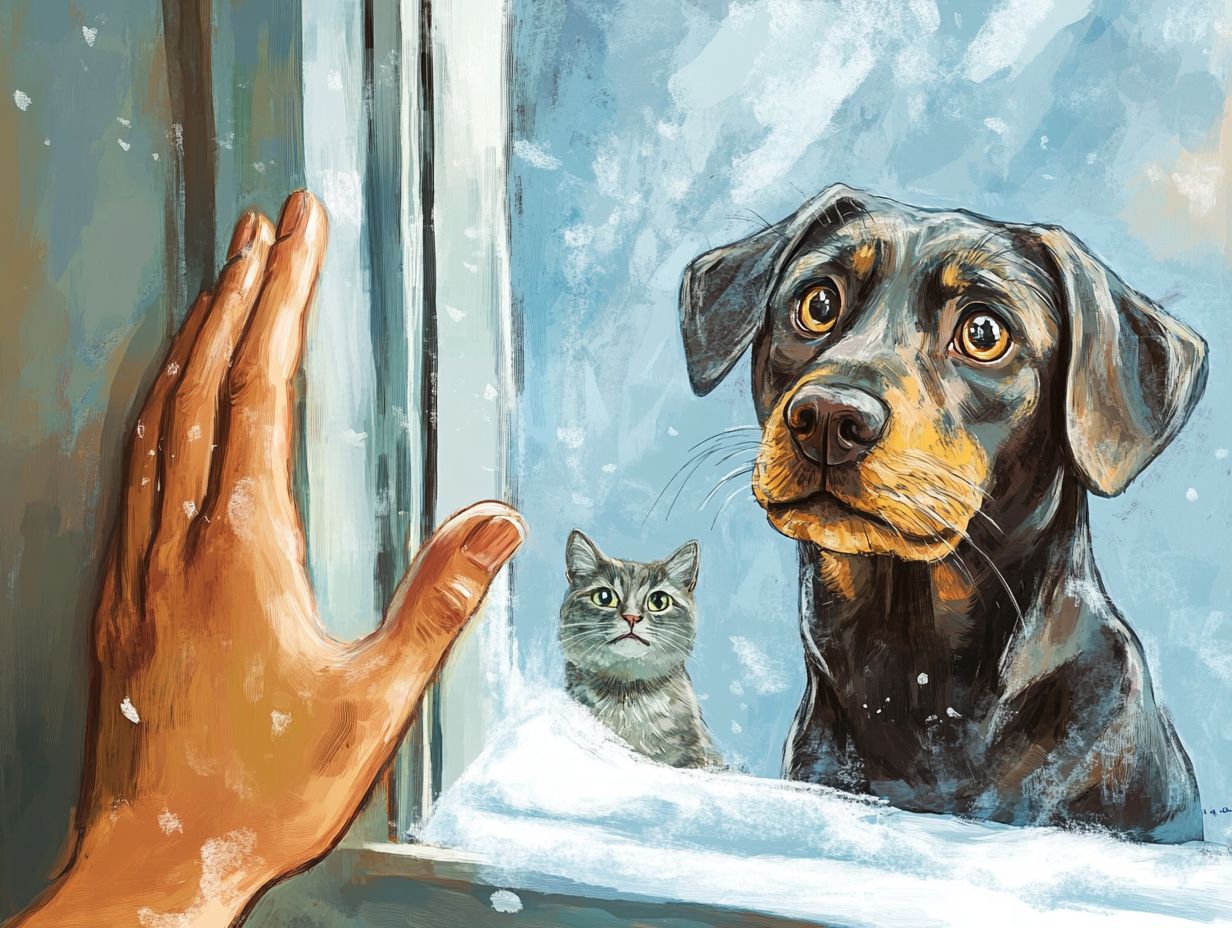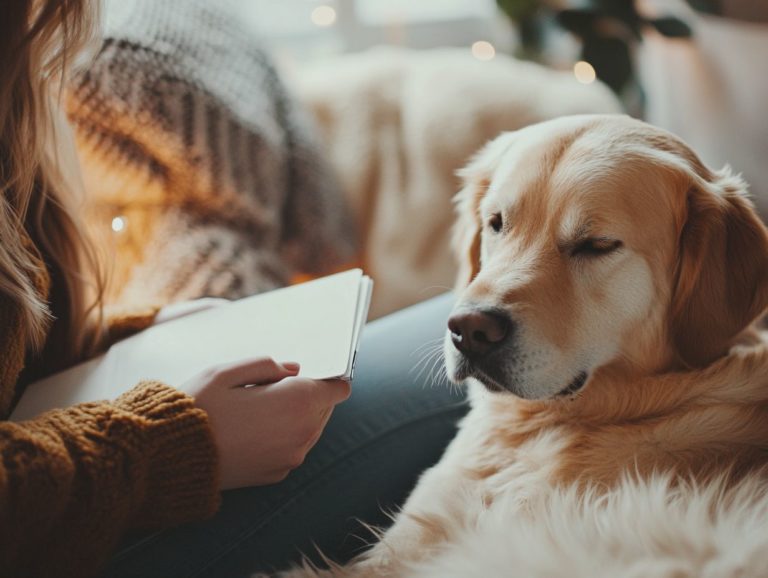Is Pet Anxiety Genetic?
Pet anxiety is a pressing concern for many pet owners, significantly impacting the well-being of your beloved companions.
In this discussion, you will delve into the origins of pet anxiety, exploring everything from genetic tendencies and breed differences to environmental factors that may heighten the issue.
You will also uncover effective management strategies and treatment options, along with valuable tips for crafting a calming environment that helps prevent canine anxieties from arising in the first place.
By understanding these factors, you can empower yourself to support your pet’s mental health and strengthen the bond you share.
Contents
- Key Takeaways:
- Understanding Pet Anxiety
- The Role of Genetics in Pet Anxiety
- Environmental Triggers for Pet Anxiety
- Managing and Treating Pet Anxiety
- Preventing Pet Anxiety
- Frequently Asked Questions
- Is Pet Anxiety Genetic?
- What breeds are more prone to developing pet anxiety?
- Can pet anxiety be passed down through generations?
- Are there any other factors besides genetics that can cause pet anxiety?
- Can pet anxiety be prevented if it is genetic?
- Is it possible for a pet to develop anxiety even if their parents do not have it?
Key Takeaways:

- Pet anxiety can be influenced by genetics, but it is not the sole determining factor. Environmental triggers and stressors also play a significant role in a pet’s anxiety levels.
- Understanding your pet’s genetic tendency towards anxiety, such as noise sensitivity or fearfulness, can help you better manage and prevent it.
- Creating a calm and safe environment for your pet can help prevent and reduce anxiety, but professional treatment may also be necessary for severe cases.
Understanding Pet Anxiety
Pet anxiety is a significant psychological concern that affects many dogs, often leading to a range of behavioral issues that can disrupt your pet’s emotional well-being and impact your quality of life. This condition is commonly observed in various breeds, such as Labrador Retrievers and Miniature Schnauzers.
Anxiety can stem from numerous factors, including environmental triggers, genetic tendencies, and the unique experiences of dog owners. By understanding the underlying causes and recognizing the signs of pet anxiety, you can effectively manage this issue. Ultimately, this enhances both your dog’s welfare and your overall experience as a pet owner.
What is Pet Anxiety?
Pet anxiety encompasses a variety of emotional disorders observed in dogs, marked by fearfulness, sensitivity to noise, and other anxiety-related behaviors that can adversely affect their psychological well-being.
This condition can manifest in several ways, such as excessive barking, destructive tendencies, and a tendency to avoid specific situations or stimuli. It s essential for you, as a pet owner or caregiver, to understand the prevalence of anxiety in different breeds, particularly those like the German Shepherd and Staffordshire Bull Terrier, which often display heightened levels of anxiety.
Recognizing the signs of distress is critical for ensuring these dogs receive the proper support and care, ultimately enhancing their emotional stability and overall quality of life.
The Role of Genetics in Pet Anxiety
Genetics significantly influence the anxiety levels in various dog breeds, shaping their behavior and emotional responses. This understanding is particularly vital for Finnish dog owners who seek to deepen their bond with their pets.
Research suggests that certain breeds, such as the Labrador Retriever and Miniature Schnauzer, may possess genetic tendencies that render them more prone to anxiety-related traits. Epigenetics also plays a role in this dynamic, as environmental factors and the owner’s experiences can further modulate these behavioral indicators.
Understanding these nuances helps you provide the best care and support for your canine companion.
Genetic Factors that Contribute to Pet Anxiety
Genetic factors play a substantial role in shaping anxiety-related traits in dogs, with certain breeds showing heightened levels of noise sensitivity, fearfulness, and various behavioral challenges.
This connection is crucial for breeds like the German Shepherd! While known for their intelligence and versatility, these dogs often face increased anxiety in high-stress situations. You might notice they become overly protective or anxious, especially in unpredictable environments.
On the other hand, Staffordshire Bull Terriers, celebrated for their affectionate nature, can also exhibit anxiety if they aren t properly socialized during their formative years. Without proper socialization, they might develop destructive behaviors when left alone.
By understanding how specific genetic markers impact these behaviors, you can help create a nurturing environment that mitigates these inherent tendencies, benefiting both you and your canine companion.
Your pet’s happiness depends on you. Let’s tackle pet anxiety together!
How Genetics Influence Behavior

The genetic makeup of a dog can significantly shape its behavior, influencing everything from anxiety responses to its overall temperament and social interactions with both humans and other animals.
This intricate connection between genetics and behavior highlights the necessity of understanding specific psychological traits that may predispose a dog to anxiety. For example, if a dog inherits traits linked to higher sensitivity, it may exhibit anxious behaviors in unfamiliar environments.
Employing behavior modification techniques, such as positive reinforcement training, along with thoughtful management of their surroundings, offers effective strategies to mitigate these inherited tendencies. By enriching a dog’s environment with engaging stimuli, you can help alleviate stress and foster a sense of security.
This nurturing can ultimately lead to a calmer demeanor and improved interactions with both people and other pets.
Environmental Triggers for Pet Anxiety
Environmental triggers greatly influence your pet’s anxiety. External factors like loud noises, shifts in routine, and traumatic experiences can all elevate anxiety levels in dogs. Knowing these triggers is key to helping your dog feel safe.
External Factors that Impact Anxiety
Various external factors can heighten anxiety in your dog, such as noise sensitivity, encounters with aggressive animals, and exposure to unfamiliar environments that might trigger compulsive behaviors.
For instance, loud thunderstorms or fireworks can turn even the calmest dogs into anxious wrecks, leading to destructive chewing or excessive barking. Consider the case of a retriever named Max, whose sudden run-in with an aggressive dog at the park left him fearful and withdrawn.
Relocating to a new neighborhood can overwhelm your dog with unfamiliar sounds, sights, and smells, intensifying their anxiety. Understanding these factors helps you manage your dog’s behavior better and implement tailored interventions that promote their overall well-being.
Managing and Treating Pet Anxiety
Managing and treating pet anxiety requires a comprehensive strategy. This often involves behavior modification techniques, exploring professional treatment options, and leveraging support from veterinary clinics to enhance your dog s health and well-being.
Effective Strategies for Reducing Anxiety
Implementing effective strategies to reduce anxiety can significantly enhance your dog’s quality of life, fostering a harmonious bond between you and your pet. By using training techniques like getting used to something and changing how your dog feels about a situation, you can help your furry friend gradually adapt to their stressors.
Engaging them in mental stimulation activities, like puzzle toys and scent games, plays a vital role in alleviating anxiety.
Making lifestyle changes like establishing a consistent daily routine and providing a safe, quiet space for relaxation can create a calmer environment for your dog. Outdoor activities and regular socialization promote positive behavior, allowing your dog to express themselves healthily.
Together, these approaches create a strong strategy for effectively managing anxiety, ensuring both you and your dog enjoy a more peaceful coexistence.
Start implementing these strategies today for your pet’s well-being!
Professional Treatment Options

Professional treatment options for your pet’s anxiety may encompass medication, training to help pets respond better to stress, and consultations with veterinary clinics that specialize in anxiety-related behavior issues.
Each of these methods varies in effectiveness based on the severity of the anxiety. Medication can offer short-term relief, helping your pet feel more at ease.
On the other hand, training aims to reshape your pet’s responses to stressors through gradual exposure and rewarding good behavior.
Veterinary specialists create tailored plans that blend these approaches, ensuring a comprehensive strategy for your pet’s well-being. It s important to monitor potential side effects of medications, such as drowsiness or gastrointestinal upset.
Engaging with professionals is vital. Their expertise will guide you through the options and help craft a personalized plan that enhances the quality of life for your anxious companion.
Consult your vet for personalized advice on the best treatment options for your pet.
Preventing Pet Anxiety
To prevent pet anxiety, start by crafting a serene and secure environment that fosters emotional well-being. This proactive approach helps to address potential anxiety triggers before they escalate into more significant challenges.
Creating a Calm and Safe Environment for Different Dog Breeds
Creating a calm and safe environment for your pet is essential in promoting their emotional well-being and reducing the likelihood of anxiety-related behaviors.
Establishing a dedicated space for relaxation can significantly enhance the tranquility of your home. This allows your furry companion to feel secure and at ease.
Consider arranging furniture and personal items to minimize clutter, crafting an inviting sanctuary where your pet can retreat whenever they need a moment of peace.
Maintaining a consistent routine like regular feeding times and scheduled play sessions provides the stability that pets thrive on.
Incorporating soothing elements, such as soft bedding, calming music, or even lavender-scented diffusers, can further ease their stress levels.
By thoughtfully managing these aspects, you can cultivate an atmosphere that nurtures your pet s emotional well-being and fosters a harmonious living environment.
Watch this video for tips on managing your pet’s anxiety effectively.
Frequently Asked Questions
Is Pet Anxiety Genetic?
Yes, pet anxiety can be genetically inherited from their parents.
What breeds are more prone to developing pet anxiety?

Certain breeds such as Border Collies, German Shepherds, and Cocker Spaniels are more prone to developing pet anxiety due to their genetics.
Can pet anxiety be passed down through generations?
Yes, if a parent pet has anxiety, it can be passed down to their offspring genetically.
Are there any other factors besides genetics that can cause pet anxiety?
Yes, pet anxiety can also be caused by environmental factors, trauma, or a lack of socialization.
Can pet anxiety be prevented if it is genetic?
While it may not be completely preventable, proper training and socialization can help reduce the likelihood of pet anxiety developing in genetically predisposed pets.
Is it possible for a pet to develop anxiety even if their parents do not have it?
Yes, while genetics can play a role in pet anxiety, it is not the only factor. Pets can develop anxiety due to a variety of reasons, including past experiences or an imbalance of certain hormones in their bodies.






